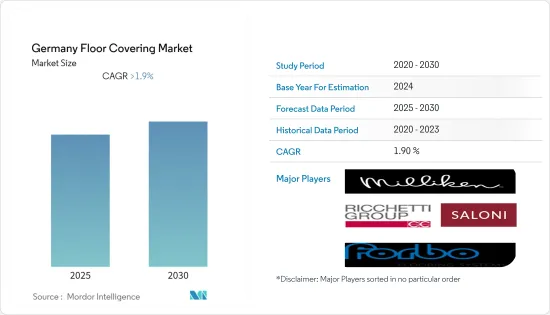 |
市場調查報告書
商品編碼
1683429
德國地板材料:市場佔有率分析、行業趨勢和統計、成長預測(2025-2030 年)Germany Floor Covering - Market Share Analysis, Industry Trends & Statistics, Growth Forecasts (2025 - 2030) |
||||||
※ 本網頁內容可能與最新版本有所差異。詳細情況請與我們聯繫。
預計預測期內德國地板材料市場的複合年成長率將超過 1.9%。

德國在西歐地板材料市場佔有很大的佔有率。由於經濟放緩導致房地產和建設活動低迷,地板材料市場在研究期間趨於成熟並實現穩步成長。市場主要受整修驅動,通常受「自己動手做」(DIY)傳統所主導。因此大多數消費群組更喜歡易於安裝且不需要花費大量時間的產品。儘管純線上趨勢正在塑造該國的分銷管道,但去商店的趨勢仍然主導著市場,因為大多數消費者更喜歡去專賣店與專家交談、透過推薦尋求建議並在購買前親自查看產品。由於 COVID-19,該行業經歷了明顯的經濟放緩,影響了地板材料市場,預計在預測期的最初幾年將需要很長時間才能恢復。預計英國和西班牙等其他西歐主要國家也將出現類似的趨勢。德國地板材料市場比較分散,幾家主要企業擁有多樣化的高品質產品。報告中介紹的幾家主要企業在整個歐盟,尤其是西歐佔有較高的市場佔有率。
德國地板材料市場的趨勢
德國建築業成長推動市場
德國建築業持續成長,目前已成為歐盟最大的建築業。該部門收益與前一年同期比較1.8%。聲學和預製建築系統等細分領域的高度專業化正在推動市場成長,並推動該國整體地板材料市場的發展。該行業的收益佔有率不斷增加,2015年僅住宅和非住宅建築就創造了6000萬美元的收入。
彈性地板材料市場日益重要
在調查期間,德國出現了大規模棄用傳統地板材料的趨勢。隨著老齡人口逐漸增加,年輕一代正在尋找更現代的解決方案。明亮的色彩組合並且能夠輕鬆融入室內裝飾變得越來越重要。此外,預計預測期內該數字還會成長。隨著德國社會的發展,人們對地板材料,尤其是地毯的興趣明顯下降。此外,地板產業呈現負成長趨勢。
德國地板材料產業概況
本報告涵蓋了在德國營運的主要企業的競爭格局。許多主要市場參與者在全球範圍內營運,並在許多歐洲國家擁有強大的市場。德國地板材料市場是行業領導者的集合,他們採用各種策略,借助快速的技術進步來提高生產能力。
其他福利:
- Excel 格式的市場預測 (ME) 表
- 3 個月的分析師支持
目錄
第 1 章 簡介
- 主要市場交付品
- 調查前提
- 研究範圍
第2章調查方法
第3章執行摘要
第4章 市場動態
- 市場概況
- 市場促進因素
- 市場限制
- 德國地板材料市場的趨勢
- 價值鏈分析
- 波特五力分析
- 技術創新
- COVID-19 對地板材料市場的影響
第5章 市場區隔
- 按材質
- 地毯和塊毯
- 彈性地板材料
- 乙烯基地板材料
- 其他彈性地板材料
- 非彈性地板材料
- 地板
- 陶瓷地板材料
- 超耐磨地板
- 石材地板材料
- 按分銷管道
- 承包商
- 專賣店
- 家裝中心
- 其他分銷管道
- 按最終用戶
- 住宅裝修
- 商業的
- 建造者
第6章 競爭格局
- 公司簡介
- Milliken Flooring
- Saloni Ceramic SA
- Gruppo Ceramiche Ricchetti SpA
- Porcelanosa Group
- Forbo Flooring GmbH
- PolyFlor
- Parador
- Egetaepper A/S
- German Flooring
- Nora Systems GmbH*
第7章 市場機會與未來趨勢
第8章 免責聲明
The Germany Floor Covering Market is expected to register a CAGR of greater than 1.9% during the forecast period.

Germany constitutes a major share in the floor covering market in the Western European Union. The market for floor coverings is mature and recorded stable growth during the study period, owing to the slowdown of economy, which led to weak real estate and construction activities. The market is majorly driven by refurbishments, which are usually led by do it yourself (DIY) traditions. Thus, the majority consumer group prefers products that are easy to install and do not involve more timelines. Even though a progression of dedicated online players is shaping the distribution channel in the country, a trend of going to the store is still dominating the market, as most consumers are still preferring going to a specialist store, in order to speak to an expert to seek help through recommendations and to physically witness the product before making a purchase. Due to COVID-19, the industry is experiencing a strong slowdown in the economy, thus affecting the market for floor coverings, and it is estimated to take much time to recover during the initial years of the forecast period. This trend is projected to be the same in the other major Western European countries, like the United Kingdom and Spain. The floor covering the market in Germany is fragmented, due to the presence of several key players with a diversified portfolio of high-quality products. Several key players mentioned in the report accounted for a high market share across the European Union, especially in the Western Europe.
Germany Floor Covering Market Trends
Growing Construction Industry in Germany is Driving the Market
The construction industry in Germany has been growing and contributes the largest share in the European Union. The revenue from the sector is recording an average growth rate of 1.8% year on year. The high level of specialization in niches, for example, the fields of acoustic and prefabricated construction systems are helping the market to grow, and they are driving the market for floor covering across the country. The industry generated USD 60 million alone from the construction of residential and non-residential buildings during 2015, and it has been recording increasing shares of revenue.
The Resilient Floor Covering Segment is Gaining More Significance
A major shift from the traditional floor coverings was observed in Germany during the study period. With the gradual increase in the aging population, the younger generation is looking for more modernized solutions. The vibrant color combinations, which easily get on with the interiors, are gaining more significance. Furthermore, they are estimated to grow during the forecast period. With the evolving German society, there is significant loss of interest, especially in flooring types, such as carpets. Furthermore, the wooden flooring segment recorded a negative growth trend.
Germany Floor Covering Industry Overview
The report covers the competitive landscape of the major players operating in the country. Most of the key players of the market have a global presence and a strong market in many of the European countries. The floor covering market in Germany is a combination of players who are leading the industry by adopting various strategies, in order to increase their production capacities with the help of rapidly changing technology advancements.
Additional Benefits:
- The market estimate (ME) sheet in Excel format
- 3 months of analyst support
TABLE OF CONTENTS
1 INTRODUCTION
- 1.1 Key Deliverables of the Market
- 1.2 Study Assumptions
- 1.3 Scope of the Study
2 RESEARCH METHODOLOGY
3 EXECUTIVE SUMMARY
4 MARKET DYNAMICS
- 4.1 Market Overview
- 4.2 Market Drivers
- 4.3 Market Restraints
- 4.4 Trends in Germany Floor Covering Market
- 4.5 Value Chain Analysis
- 4.6 Porter's Five Forces Analysis
- 4.7 Technological Innovations
- 4.8 Impact of COVID - 19 on Floor Covering Market
5 MARKET SEGMENTATION
- 5.1 By Material
- 5.1.1 Carpet and Area Rugs
- 5.1.2 Resilent Flooring
- 5.1.2.1 Vinyl Flooring
- 5.1.2.2 Other Resilient Flooring
- 5.1.3 Non-resilent Flooring
- 5.1.3.1 Wood Flooring
- 5.1.3.2 Ceramic Flooring
- 5.1.3.3 Laminate Flooring
- 5.1.3.4 Stone Flooring
- 5.2 By Distribution Channel
- 5.2.1 Contractors
- 5.2.2 Specialty Stores
- 5.2.3 Home Centers
- 5.2.4 Other Distribution Channels
- 5.3 By End User
- 5.3.1 Residential Replacement
- 5.3.2 Commercial
- 5.3.3 Builder
6 COMPETITIVE LANDSCAPE
- 6.1 Company Profiles
- 6.1.1 Milliken Flooring
- 6.1.2 Saloni Ceramic SA
- 6.1.3 Gruppo Ceramiche Ricchetti SpA
- 6.1.4 Porcelanosa Group
- 6.1.5 Forbo Flooring GmbH
- 6.1.6 PolyFlor
- 6.1.7 Parador
- 6.1.8 Egetaepper A/S
- 6.1.9 German Flooring
- 6.1.10 Nora Systems GmbH*













